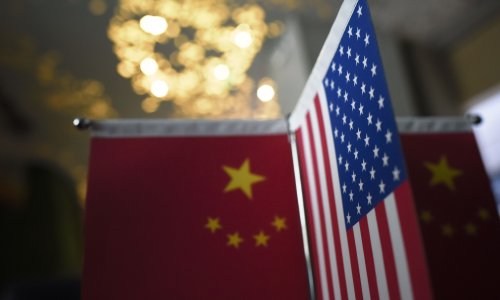Weaponizing Trade

Photo: WANG ZHAO/AFP via Getty Images
There is a new term (for an old idea) making its way through trade circles these days: “weaponization” of trade. It means using trade as a tool of foreign policy rather than as an economic goal in and of itself.
This is not a new idea. Embargoes and trade restrictions of various kinds go back centuries. Sometimes they have simply amounted to statements of principle, particularly when the affected trade was minimal anyway. Other times they have had an impact. Some historians, for example, argue that the U.S. oil embargo of Japan in the 1930s led directly to the attack on Pearl Harbor. Civil society organizations have claimed that economic sanctions on South Africa were instrumental in ending apartheid, although many South Africans would have a different view on that.
In recent years, however, there have been two trends that have in the first case significantly changed the trade landscape and in the second threaten to do so. The first is the evolution of economic sanctions away from the traditional broad-brush approach of total or selective embargoes and toward “particularization”—sanctioning specific individuals or companies for their misdeeds, often with financial sanctions rather than trade restrictions. This began in the George W. Bush administration but has escalated rapidly since then. This development has had several effects:
- It has lowered the bar for taking these actions. It is much easier to target an individual or a company than an entire country.
- It requires (or should require) more research into specific targets to make sure action is warranted. With broad-brush sanctions, collateral damage is assumed and taken into account.
- It increases the compliance burden on companies doing business in complicated locations. The Bureau of Industry and Security Entity List, for example, is over 400 pages, and that is just one of a number of U.S. government lists of companies and individuals facing restrictions.
The second trend is exemplified by China, which has taken weaponization to new heights. After Liu Xiaobo was awarded the Nobel Peace Prize in 2010, Chinese trade with Norway was severely reduced and did not begin to recover until after the king of Norway visited China in October 2018, more than a year after Liu’s death. More recently, China has taken similar actions against Australia after the latter called for an investigation into the origins of Covid-19. Following the U.S. example, China also severely limited access to National Basketball Association games after a team official spoke out in support of Hong Kong. In the same vein, the United States has announced a diplomatic boycott of the Winter Olympics—not exactly trade, but the same idea.
Sadly, the United States bears a good share of responsibility for these developments, having expanded and refined the concept and employed it with increasing enthusiasm. We now see it coming back to bite us as U.S. companies are called out by China for saying or doing things the Chinese find objectionable or declining to do what the Chinese ask them to do. Most recently, China has threatened to retaliate if the China bill now being considered by Congress is enacted. We are also seeing countries beginning to engage in non-dollar transactions in order to avoid entanglement with the U.S. Treasury Department.
From the U.S. point of view, the latest actions by China are concerning. The Chinese seem to be taking things to a different level in the case of Australia by cutting off normal trade among parties not directly involved in a dispute, but it appears that many countries would argue that such actions are okay if they do them but not if someone else does. The result is that actions that may be politically popular at home and may not be of great economic consequence if viewed one by one take on greater significance when there are many of them and when nations get away with them.
Collectively, they erode the disciplines in the trading system we have built up over 70 years. The fact that the WTO dispute resolution system is not fully operational contributes to the problem by allowing the sinners to keep on sinning with impunity. Up until the Trump administration, nations could count on the United States to stand for systemic discipline by setting an example of both using the system and respecting its outcomes—win or lose. We lost that credibility in the past four years, but it is more discouraging to see that the current administration does not seem particularly interested in restoring it. It is not trying to resolve the WTO Appellate Body issues that have prevented the body from operating, and it has felt free to advance domestic proposals, like the EV tax credit and various domestic procurement rules, that clearly violate our multilateral obligations. Most of the conversations I have had this year with people from other countries have begun with them asking if the United States was really “back” and if it was here to stay. They were concerned about our next election, but it appears that they should also be concerned about the last one, at least with respect to trade policy.
William Reinsch holds the Scholl Chair in International Business at the Center for Strategic and International Studies in Washington, D.C.
Commentary is produced by the Center for Strategic and International Studies (CSIS), a private, tax-exempt institution focusing on international public policy issues. Its research is nonpartisan and nonproprietary. CSIS does not take specific policy positions. Accordingly, all views, positions, and conclusions expressed in this publication should be understood to be solely those of the author(s).
© 2021 by the Center for Strategic and International Studies. All rights reserved.
